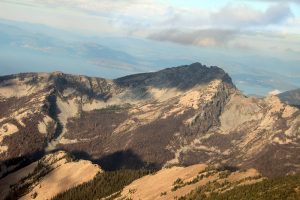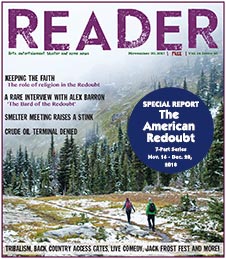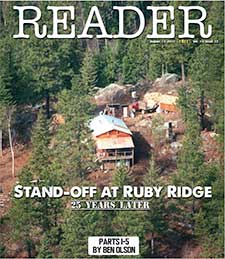Sen. Risch introduces Scotchman wilderness bill
By Cameron Rasmusson
Reader Staff
After years of work, local conservation activists are celebrating a newly-introduced federal bill to enshrine the Scotchman Peaks as wilderness.
Introduced last week by U.S. Sen. Jim Risch, the bill calls for the protection of 13,900 acres of mountainous land throughout North Idaho. The legislation is designed to preserve the hiking trails, mountaintop vistas and other recreational features of the area for the public, as well as protect the varied wildlife species and old-growth forest. Of course, there’s always the mountain goat herd—the de facto wilderness mascots and occasional people-biters—to think of, too.
“It’s very gratifying [to have a bill introduced], and it’s validating of the process we put together to build community support,” said Phil Hough, executive director of the Friends of Scotchman Peaks Wilderness. “We appreciate Sen. Risch’s leadership and vision. It’s a bold step forward.”
The push for wilderness designation is a decade-long effort by the Friends of Scotchman Peaks Wilderness, which formed in 2005 as advocacy group for the proposal. Over the course of several years, the organization’s staff and volunteers have accumulated a broad base of support, including a key endorsement from Idaho Forest Group, North Idaho’s largest timber company.
“There are some parts of the national forest that should be managed for timber production and some parts of the forest that should be managed for wilderness,” IFG spokesperson Bob Boeh said in a statement. “The Scotchman Peaks Wilderness proposal is a collaborative process that involved diverse stakeholders.”
Also among the supporters are 6,700 individuals, 80 percent of whom live within two hours of the Scotchman Peaks. Several newspaper editorial boards and local politicians endorsed the measure as well, with the Bonner County Board of Commissioners signing on last year.
“This is an opportunity to say that while we’re conservative, we do support environmental issues when it’s appropriate,” said Commissioner Chairman Cary Kelly.
With Hough, Kelly and Boeh offering active support, the wilderness proposal achieved a three-pillar foundation that Kelly said made it a much easier sell to Risch.
“Between the three of us, I think it was important to cover the political aspect, the economic aspect and the local support aspect,” he added.
With the bill introduced, it remains to be seen how it will proceed through Congress. According to Hough, Risch will likely need to reintroduce the bill some time early next year. Hough is hoping the proposal will come up for a committee hearing in January after Risch takes the steps he feels are necessary to build support.
“We hope that the introduction [this month] results in a hearing sooner rather than later,” Hough said.
While there’s always the potential for unexpected obstacles as the bill proceeds through Congress, supporters are hopeful that the wilderness proposal will be relatively uncontroversial. In the history of the Wilderness Act, only one bill has been vetoed—a Montana proposal shut down President Ronald Reagan in 1988.
“The passage [of the Scotchman bill] shouldn’t engender a lot of controversy,” Hough said.












 Coming up this week! Don’t miss Live Music, the Summer Sampler, the Art Party, Monarch Grind, the Sandpoint Renaissance Faire, and more! See the full list of events in the
Coming up this week! Don’t miss Live Music, the Summer Sampler, the Art Party, Monarch Grind, the Sandpoint Renaissance Faire, and more! See the full list of events in the 